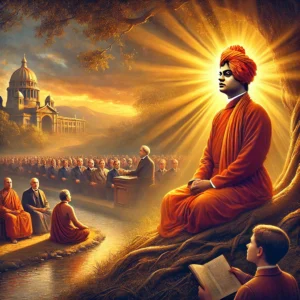Swami Vivekananda”s Life Journey
Swami Vivekananda’s Life Journey: A Beacon of Wisdom and Inspiration
Swami Vivekananda is a name that resonates with spiritual brilliance, intellectual depth, and a burning desire to uplift humanity. Though his life was short—spanning only 39 years—his teachings and actions have left an indelible mark on the world. Known for his message of universal brotherhood and self-empowerment, Swami Vivekananda’s journey is a source of endless inspiration. Let’s delve into the remarkable life of this extraordinary leader.
The Early Years of Swami Vivekananda
Swami Vivekananda was born as Narendranath Datta on January 12, 1863, in Kolkata, India. His family’s unique blend of traditional spirituality and modern thinking shaped his early life. While his father, Vishwanath Datta, was an accomplished lawyer with progressive views, his mother, Bhuvaneshwari Devi, was a deeply spiritual woman who instilled in him the values of compassion and discipline.
From childhood, Narendranath exhibited a sharp intellect and an insatiable curiosity. He excelled in academics, music, and sports, but what set him apart was his relentless questioning of life’s deeper truths. His quest to understand spirituality led him to ask profound questions that would later define his path.
The Life-Changing Encounter with Sri Ramakrishna
Narendranath’s life took a transformative turn when he met Sri Ramakrishna Paramahamsa, a mystic saint from Dakshineswar. Their first meeting was marked by Narendranath’s question, “Have you seen God?” Sri Ramakrishna’s reply, “Yes, I see Him as clearly as I see you,” left a deep impression on the young seeker.
Under Sri Ramakrishna’s guidance, Narendranath experienced a spiritual awakening. Sri Ramakrishna saw immense potential in his disciple and prepared him for a greater mission—one that would transform not only India but the world. After the saint’s passing in 1886, Narendranath took the vows of a monk, adopting the name Swami Vivekananda and dedicating his life to spreading the ideals of Vedanta and service to humanity.
Swami Vivekananda’s Journey Across India
As a wandering monk, Swami Vivekananda traveled extensively across India, observing the challenges faced by people from all walks of life. The dire poverty, lack of education, and social inequalities deeply moved him. These experiences strengthened his resolve to uplift the masses through spiritual and social reform.
He believed that true spirituality went beyond rituals and dogma. For him, it was about compassion, service, and the realization of one’s divine potential. His travels also reinforced his belief that India’s ancient wisdom could address not only its own problems but also those of the world.
The Chicago Speech That Changed the World
One of the most iconic moments in Swami Vivekananda’s life came in 1893 when he addressed the Parliament of the World’s Religions in Chicago. His speech began with the now-famous words, “Sisters and Brothers of America,” which immediately earned him a standing ovation.
In his address, Swami Vivekananda emphasized the universal nature of spirituality, advocating for harmony and acceptance among religions. He spoke about India’s rich spiritual heritage and its relevance to modern challenges. This landmark speech catapulted him to international fame, making him a bridge between Eastern and Western philosophies.
Founding the Ramakrishna Mission
After returning to India in 1897, Swami Vivekananda founded the Ramakrishna Mission to carry forward his vision of service and spiritual enlightenment. The Mission’s work focused on social reform, education, healthcare, and disaster relief, embodying his ideal of “serving God through humanity.”
Swami Vivekananda believed that spiritual progress and material development must go hand in hand. He encouraged people to work tirelessly for the betterment of society, stressing that service to others is the highest form of worship.
Key Teachings and Legacy
Swami Vivekananda’s teachings remain as relevant today as they were during his lifetime. His message of self-confidence, hard work, and universal brotherhood continues to inspire millions. Some of his most enduring ideas include:
- Self-Empowerment: “Arise, awake, and stop not till the goal is reached” is a call to action for everyone to strive for their highest potential.
- Unity of Religions: He emphasized that all religions are paths to the same truth and should foster harmony rather than division.
- Service to Humanity: Swami Vivekananda viewed selfless service as the highest expression of spirituality.
- Education for All: He believed education was the key to empowerment and envisioned a system that combined spiritual and practical knowledge.
He also advocated for the empowerment of women and the eradication of social evils, dreaming of an India that stood strong, united, and spiritually awakened.
The Final Chapter
Swami Vivekananda passed away on July 4, 1902, at the age of 39. Despite his brief life, his influence has transcended generations and geographies. His teachings continue to inspire leaders, thinkers, and seekers around the globe.
Conclusion: The Eternal Relevance of Swami Vivekananda
Swami Vivekananda’s life journey is a testament to the power of faith, determination, and service. His legacy reminds us of the boundless potential within each individual and the transformative impact of living with purpose.
Whether through his iconic Chicago address, the work of the Ramakrishna Mission, or his timeless teachings, Swami Vivekananda remains a guiding light for those seeking wisdom, courage, and inspiration. Let us honor his life by embodying his ideals and striving for a world rooted in unity and compassion.





